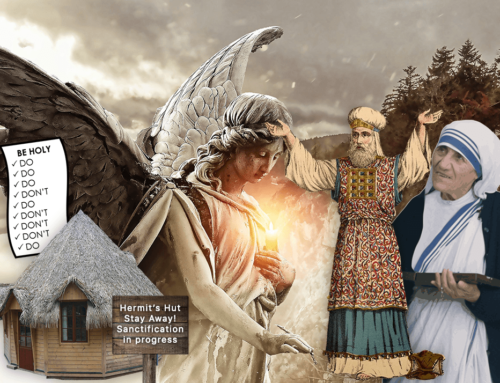 Make me know Your ways, O LORD; Teach me Your paths. All the paths of the LORD are lovingkindness and truth to those who keep His covenant and His testimonies.
Make me know Your ways, O LORD; Teach me Your paths. All the paths of the LORD are lovingkindness and truth to those who keep His covenant and His testimonies.
(Psalm 25: 4,10 NASB)
Do you remember the story of Jesus calling Matthew the tax collector to follow Him? Matthew celebrated by throwing a big dinner party for Jesus at His house. And of course, when the Pharisees saw Jesus sitting at the table with “tax collectors and sinners” they were indignant. You probably remember what Jesus said to them. He said, “It is not those who are healthy who need a physician, but those who are sick.”
But do you know what else He said? He said this, “But go and learn what this means: ‘I DESIRE COMPASSION, AND NOT SACRIFICE,’ for I did not come to call the righteous, but sinners.” (Read the story in Matthew 9:9-13)
Jesus was referring to a passage in Hosea where the Lord was speaking through the prophet, lamenting the ways of His people.
“O Israel and Judah, what should I do with you?” asks the LORD.
“For your love vanishes like the morning mist and disappears like dew in the sunlight.
I sent my prophets to cut you to pieces—to slaughter you with my words,
with judgments as inescapable as light.
I want you to show love, not offer sacrifices.
I want you to know me more than I want burnt offerings.
But like Adam, you broke my covenant and betrayed my trust.” (Hosea 6:4-7 NLT)
I can imagine the Pharisees walking away from Jesus with the same sense of confusion that many of their forefathers had before them. After all, God Himself had ordained the sacrificial system, had He not? And those who did not follow Mosaic law were ritually unclean, were they not?
Wasn’t the point of that passage in Hosea that God was lamenting the disobedience of His people? How could the words of Hosea condone a righteous Jew eating in the same house, even at the same table—G-d forbid—with the unclean?
But the Pharisees had missed a fundamental truth about the nature of God. And this is what Jesus wanted them to see. God says,
I desire compassion, not sacrifice.
I want you to show lovingkindness, not offer sacrifices.
I want you to know me more than I want burnt offerings.
In Hosea, God uses the word chesed to describe what He desires from His people. The Hebrew word chesed appears 251 times in the Old Testament. Of those, the NASB translates it lovingkindness 173 times (almost 69%), and kindness 32 times (another 13%). The other 18% of the time, chesed is translated with variations on the words love and kindness, or with words like mercy, righteousness, faithfulness, loyalty, and devotion.
God had provided laws regarding uncleanness and sacrifice because it was necessary. The need for such things reflect the holiness, righteousness and justice of a God who desired to gather to Himself a sinful people. Today, because of the death and resurrection of Jesus Christ, the holiness, righteousness and justice necessary to approach God are provided in Christ, by the grace of God, to those who have received Him.
In Christ, our worship of God no longer requires us to follow kosher laws or present burnt offerings. But that doesn’t mean that Jesus’ words regarding compassion do not apply to us, because the nature and ways of God do not change. The Pharisees understood and followed the rules, but they had missed a fundamental truth about God’s nature and God’s ways.
We may easily miss the same truth.
As I continued reading in Matthew, I found that Jesus once again quoted the same passage from Hosea. This time, Jesus and his disciples are walking through a field of grain on the Sabbath. Because they are hungry, they pick a few heads of grain to eat. (Note: To eat a handful of a neighbor’s grain was permitted according to Deut. 23:25.)
The Pharisees immediately jump on what they consider to be a violation of God’s Law, specifically the Third Commandment: Remember the Sabbath to keep it holy.
So, Jesus responds by reminding them that King David had done something similar when he and his men had entered the tabernacle and eaten the consecrated bread that only the priests were allowed to eat. Not only that, but the priests themselves were commanded by God to work on the Sabbath when offering sacrifices. Jesus quoted from Hosea, saying,
“But if you had known what this means, ‘I DESIRE COMPASSION, AND NOT A SACRIFICE,’ you would not have condemned the innocent. For the Son of Man is Lord of the Sabbath.” (Matt. 12:7)
Once again, the Pharisees had missed a fundamental truth about the nature of God, namely, compassion and lovingkindness take precedence over acts of piety.
In the words of the Apostle Paul,
…if I give all my possessions to feed the poor, and if I surrender my body to be burned, but do not have love, it profits me nothing… faith, hope, love, abide these three; but the greatest of these is love. (1Cor. 13:3,13)
God’s way is the way of compassion and lovingkindness. The way of chesed.
As John Wesley observed,
“… there are works of mercy as well as works of piety, which are real means of grace.” John Wesley, Sermons: On Visiting the Sick
“… [one should] show his zeal for works of piety; but much more for works of mercy; …Whenever, therefore, one interferes with the other, works of mercy are to be preferred.” John Wesley, Sermons: On Zeal
The Pharisees had placed their works of piety–such as following the letter of the Law in regards to cleanliness and observing the Sabbath–above works of mercy. They performed their sacrifices, but neglected to show compassion and lovingkindness.
Jesus turned that understanding upside down. When asked,
“Teacher, which is the great commandment in the Law?” And He said to him, “‘YOU SHALL LOVE THE LORD YOUR GOD WITH ALL YOUR HEART, AND WITH ALL YOUR SOUL, AND WITH ALL YOUR MIND.’ This is the great and foremost commandment. The second is like it, ‘YOU SHALL LOVE YOUR NEIGHBOR AS YOURSELF.’ On these two commandments depend the whole Law and the Prophets.” (Matt. 22:36-40)
In other words, if you begin with compassion and lovingkindness, if you make love the priority, everything else falls into place. And of course, in the Greek, the word for love is agapao, meaning unconditional, selfless love: the kind of lovingkindness that is foundational to the nature of God; not the kind of self-centered, selfish love that we often show. Agape love always acts in the best interest of the other.
God’s way is the way of compassion, of lovingkindness and of truth.
So, what does that mean for you and me? What does God require of me?
The prophet Micah asked that very question. And he provided us with God’s answer. He wrote,
With what shall I come to the LORD
And bow myself before the God on high?
Shall I come to Him with burnt offerings,
With yearling calves?
Does the LORD take delight in thousands of rams,
In ten thousand rivers of oil?
Shall I present my firstborn for my rebellious acts,
The fruit of my body for the sin of my soul?
He has told you, O man, what is good;
And what does the LORD require of you
But to do justice, to love kindness,
And to walk humbly with your God? (Micah 6:6-8 NASB)
So what does God require of you?
First, to practice justice.
In everyday terms, this means I need to do what is right in my relationships with others. That is, what is right in God’s eyes. I need to know God’s ways which arise out of His nature. Therefore, I need to continually seek to know Him and to understand His ways.
We could spend a lifetime learning what it means to act justly in my relationships and in all that I do. But one thing I will say, justice is not always fairness. We have a sense that fairness means to treat everyone identically and equally. But fairness is not always justice.
To practice justice, according to the Scriptures, also means that we may need to look out for the needs of those who are suffering injustice at the hands of others: the poor, the oppressed, the disenfranchised, the abused, the neglected. God has much to say about caring for those in need, but that is a discussion for another day.
The second thing God requires of you is to love kindness.
The word here, once again, is chesed. Literally it reads: to love lovingkindness.
I need, and you need, to practice lovingkindness in my relationships with others. I need to act with kindness and mercy and goodness. I need to show the lovingkindness of the Lord God toward others, regardless of how they may treat me.
And yes, it is hard. That is why we need His Spirit to help us.
Lovingkindness is intentional. You cannot passively or accidentally show kindness toward another. You cannot accidentally respond in kindness toward angry, hurtful, hurting people. You must choose to respond with kind words. You must actively seek ways to demonstrate kindness in your actions.
This doesn’t mean you should place yourself in a dangerous position, unless God specifically and clearly calls you to do so. But it does mean you may need to re-think many of your responses toward people in everyday situations.
God wants you to love lovingkindness–not only to act or speak kindly out of duty or begrudgingly. To love lovingkindness requires a change of heart that comes from God Himself.
And therefore, God requires of you to walk humbly with your God.
To live my life with humility requires that I deny myself, take up my cross, and follow Jesus. In other words, I need to accept that my life is not all about me. And because it is not all about me, I need to come before God daily to find out what He has for me to do. Then, I need to follow Him in doing it.
At this point, it is easy to try to follow God in my own way. And when I do, I fall into the same trap the Pharisees did. I forget that my life is not about doing things my way.
If I belong to Jesus Christ, my life is about doing things His way. God desires compassion, not sacrifice. If I am going to walk with God, I need to go where He leads, do what He puts in my path to do, and love the people He puts in my path to love.
And that is why the prophet Micah didn’t just say “walk with your God” but “walk humbly with your God.” To walk humbly means that I make myself neither greater nor lesser than I am, but rather, that I take the focus off myself and follow where He leads, doing what He shows me to do, and doing it according to His ways.
The thing that God asks you to do may not be what you think it will be. It may not be anything you are comfortable with, or anything you feel prepared to do. In fact, if it were something you could do on your own, you would not need God in your life!
In whatever He shows us to do, let us remember that His way is the way of compassion and lovingkindness. Our part is to do what is right, to do it with lovingkindness, and to depend on Him to provide and to lead the way.
Pastor Cindy





Great read. After our Pastor did a sermon like this, Hermann kept talking about how it’s all about love!
The photo you chose really helped to stir my heart towards the compassion that you speak of in your message.